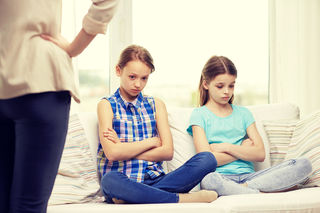Health
What Really Happens When Parents Hit Their Kids
50 years of research on 160,000 children shows spanking is harmful. Period.
Posted April 29, 2016 Reviewed by Gary Drevitch
In a previous post, I described the negative impact that spanking has on children as well as on the parents who spank them:
- Hitting children teaches them that might makes right.
- Adults frequently get out of control when they hit children.
- Hitting your children may stop their bad behavior but will damage them and your relationship with them in the long run.

A recent paper published in The Journal of Family Psychology shows just how damaging spanking can be. The paper summarized a meta-analysis of 50 years of research involving more than 160,000 children. The analysis was conducted by Elizabeth Gershoff, associate professor of Human Development at the University of Texas-Austin, and Andrew Grogan-Kaylor, associate professor of Social Work at the University of Michigan. The results showed unequivocally that spanking (defined as an open-handed hit on the behind or extremities) was significantly linked to detrimental outcomes.
In a release, the authors reported:
“Spanking thus does the opposite of what parents usually want it to do…[O]ur research shows that spanking is linked with the same negative child outcomes as abuse, just to a slightly lesser degree.”
The researchers looked at the impact of spanking on several indices of mental health and behavioral outcomes. You can see the effects in the chart below.

The longer the bar, the stronger the negative impact. The research team found that, compared to children who were not spanked, those who were spanked showed:
- more aggression;
- more antisocial behavior;
- more externalizing behavior problems, such as acting out;
- more internalizing behavior problems, such as becoming withdrawn;
- more mental health problems;
- lower self-esteem;
- more negative relationships with parents.
Parents often justify spanking because they insist it is the only way to teach children the difference between right and wrong. Yet the results clearly showed that spanking was also significantly associated with lower moral internalization ability.
The researchers also found that spanking was associated with lower cognitive ability among children. This results jibes with recent neuroscientific research showing that children who are regularly spanked have less gray matter in certain areas of the prefrontal cortex that have been linked to cognitive performance and mental health disorders. They reported finding significant correlations between the amount of gray matter in these brain regions and children's performance on an IQ test.
The researchers also found that adults who had been spanked as children were more in favor of spanking than those who had not been spanked. Those who still believe spanking is the best way to discipline children should note that the largest effect size the researchers found was for physical abuse: The more children are spanked, the greater the risk that they will be physically abused by their parents. I've previously described how parents who spank put themselves at risk for becoming child abusers:
As adults, we frequently come home frustrated, tired, and angry. We haven't the patience to deal with what our kids may be dishing out. Once you begin hitting the child who is pushing your buttons, you will experience enormous relief. And that pleasant relief can drive you to hit even more, even harder.
The detrimental effects of spanking continue well into adulthood, impairing an individual's ability to cope effectively with life's challenges. Specifically, two adult outcomes were significantly associated with a history of spanking from parents—adult antisocial behavior, and adult mental health problems.
It is important to note that the results of the current meta-analysis are remarkably robust, and that the individual studies included in the analysis are highly consistent—71% of all of the effect sizes, and 99% of the significant effect sizes, indicated a significant association between parental spanking and detrimental child outcomes.
Experts have been following the research on the relationship between spanking and poor mental health outcomes, and have used them to draw up policies condemning the practice. The Committee on the Rights of the Child did so in 2006, and the American Academy of Pediatrics followed suit in 2012.
Parents who spank their children sometimes resist giving up this practice because they don't see how else they are going to get their children to comply. Parents can find guidance in this brief video in which Dr. Jennifer Hartstein, child and adolescent psychologist, describes the right discipline for each stage of development.
Follow me on Twitter, Google+ and LinkedIn.
Copyright Dr. Denise Cummins 2016.




